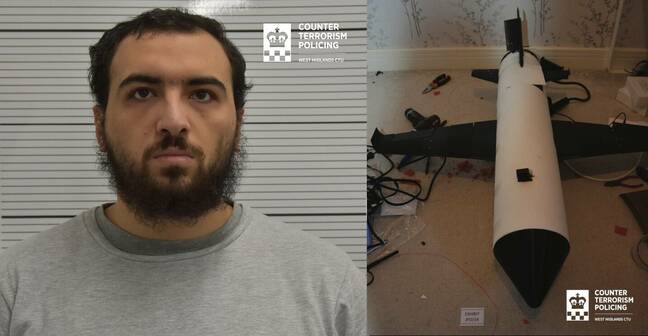PhD student guilty of 3D-printing 'kamikaze' drone for Islamic State terrorists
'Research purposes' excuse didn't fly
A PhD student has been found guilty of building a potentially deadly drone for Islamic State terrorists, in part using his home 3D printer.
Mohamad Al Bared, 26, a mechanical engineering graduate who was studying at Birmingham University in England, was convicted on Thursday of engaging in conduct in preparation of terrorist acts to benefit a proscribed terrorist organization, and faces possible life in prison when he is sentenced next month. He remains behind bars.
During the five-week trial, the prosecution said Al Bared had designed a single-use, video-transmitting "kamikaze" drone "somewhat inspired by the design of the Tomahawk missile," and used a 3D printer to build the wings.
Al Bared was said to have sent weekly updates to IS, so that the terrorist group could copy his designs, and this earned his chunky-looking drone a starring role in a propaganda video that the fanatics shared on Telegram. One wonders if it could have actually flown, but that's perhaps by the by.
Police arrested Al Bared on January 31 after finding the drone, which prosecutors say was potentially capable of delivering a bomb or chemical weapon, at the home he shared with his parents in Kare Road, Coventry. The cops also reportedly discovered at the home an IS application form, and other information indicating his support for the terrorist organization.
During a raid, officers seized the drone, the 3D printer, and electronic devices including phones and laptops. The plod also found hand-written notebooks containing recipes for chemical weapons, it's reported.

Mugshot of Mohamad Al-Bared with a drone he designed and built ... Source: Counter Terrorism Policing West Midlands
After analyzing the phones and laptops, detectives uncovered "a series of conversations … clearly demonstrating his support for ISIS as well as extremist material and violent propaganda videos," according to Britain's anti-terrorism police.
Other messages on the equipment included conversations about Al Bared's research, and details on how to smuggle the drone into a war zone without being detained. The cops say he also set up a spoof company to make it look like he was traveling for business purposes and evade suspicion.
- US Supreme Court allows 'ghost guns' to fall under federal purview
- Convicted felon busted for 3D printing gun parts
- US govt IT help desk techie 'leaked top secrets' to foreign nation
- Russian allegedly smuggled US weapons electronics to Moscow
During Al Bared's trial, the lead prosecutor told the jury the PhD student was inspired by Russian drone strikes in Ukraine, and had designed the single-use drone to fly into a crowd or building to cause mass casualties.
"It was a prototype being developed, something that could easily be built in the field, by the 'brothers,' each drone being sent on its way to kill innocent people," prosecutor Michelle Heeley told the court.
Prosecutors, citing encrypted online messages and other digital communications, also said Al Bared had researched chemicals including sarin, ricin, and mustard gas, as well as looking for details on mechanical detonators and how to build an "explosive" head for the drone.
"What drone for legitimate use needs an explosive head?" Heeley asked the court.
In his defense, according to his barrister, Al Bared, who denied being an Islamic State supporter, was described as "mild mannered" by his friends, and claimed to have made the drone and studied IS materials — including videos of beheadings — for his own research purposes. It was said he looked into IS to help him argue against the terror org at his mosque. That all just didn't fly with the court. ®
 Biting the hand that feeds IT
Biting the hand that feeds IT